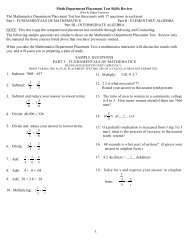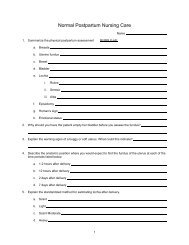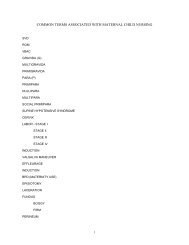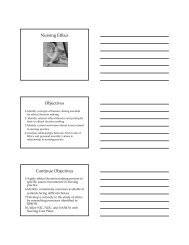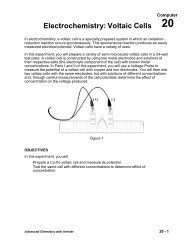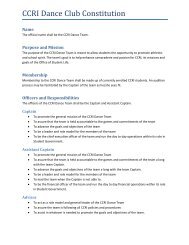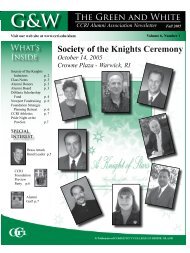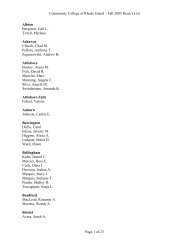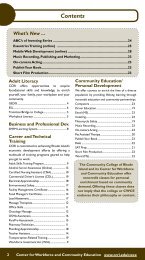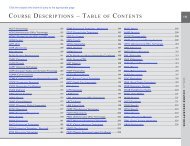Course Descriptions - Community College of Rhode Island
Course Descriptions - Community College of Rhode Island
Course Descriptions - Community College of Rhode Island
You also want an ePaper? Increase the reach of your titles
YUMPU automatically turns print PDFs into web optimized ePapers that Google loves.
UPDATED 5/16/11<br />
Cooperative eduCation<br />
See LIBA 1010 and 1020, ADAS 2580 and<br />
2590 and MEDL 2910 for appropriate<br />
course sections.<br />
CSCo (networking<br />
CertifiCation)<br />
CSCO 1850 - Networking Technology -<br />
3 Credits<br />
This course provides students with a thorough<br />
understanding <strong>of</strong> how basic networking<br />
components work in a practical<br />
hands-on environment utilizing state<strong>of</strong>-the-art<br />
telecommunications equipment.<br />
Lecture: 2 hours, Lab: 2 hours<br />
CSCO 1860 - Intermediate Networking -<br />
3 Credits<br />
This course focuses on networking terminology<br />
and protocols, networking standards,<br />
LAN, WAN, OSI modules, Ethernet,<br />
Token ring, FDDI, TCP/IP addressing protocol,<br />
dynamic routing and the network administrator’s<br />
role and function. (Prerequisite: CSCO<br />
1850) Lecture: 2 hours, Lab: 2 hours<br />
CSCO 1870 - Local Area Networking<br />
(LAN) Design and Management -<br />
3 Credits<br />
This course focuses on advanced networking<br />
concepts that enable students to design<br />
and implement local area networks and<br />
virtual local area networks. (Prerequisite: CSCO<br />
1860) Lecture: 2 hours, Lab: 2 hours<br />
CSCO 1880 - Wide Area Networking<br />
(WAN) Design and Configuration -<br />
3 Credits<br />
This course focuses on advanced networking<br />
concepts that enable students to design and<br />
implement wide area networks. (Prerequisite:<br />
CSCO 1870) Lecture: 2 hours, Lab: 2 hours<br />
CSCO 1990 - Network Security<br />
Hardware - 4 Credits<br />
This course concentrates on network security<br />
procedures and practices as they apply to<br />
routed networks. Security threats and their<br />
management, intrusion detection, securing<br />
networks through hardware devices, Authentication,<br />
Authorization and Accounting (AAA),<br />
firewall technologies, cryptographic systems<br />
and virtual private networks (VPNs) are<br />
included. (Prerequisite: CSCO 1880 or equivalent<br />
experience Recommended: Successful completion<br />
<strong>of</strong> CCNA exam and Cisco Certified Academy<br />
attendance or demonstrated pr<strong>of</strong>iciency using<br />
laboratory equipment) Lecture: 3 hours, Lab: 3<br />
hours<br />
CSCO 1991 - Network Security: PIX<br />
Firewall - 4 Credits<br />
This course concentrates on network security<br />
procedures and practices as they apply<br />
to PIX firewalled networks. Security management,<br />
intrusion detection, secure connectivity<br />
and virtual private networks (VPNs) are<br />
included. (Recommended: Successful completion<br />
<strong>of</strong> CCNA exam and Cisco Certified Academy<br />
attendance or demonstrated pr<strong>of</strong>iciency using<br />
laboratory equipment) Lecture: 3 hours, Lab: 3<br />
hours<br />
CSCO 2010 - Advanced Routing -<br />
5 Credits<br />
Advanced routing covers specialized routing<br />
concepts including advanced IP addressing<br />
techniques, CIDR, NAT, DHCP, IP helper<br />
addresses, dynamic routing, static routing,<br />
default routing, single-area OSPF, point-tomultipoint<br />
OSPF, multi-area OSPF, EIGRP,<br />
route summarization, route redistribution,<br />
route filters, route maps, policy routing, BGP<br />
and network security. (Recommended: Successful<br />
completion <strong>of</strong> CCNA exam and Cisco<br />
Certified Academy attendance or demonstrated<br />
pr<strong>of</strong>iciency using laboratory equipment) Lecture<br />
and Lab: 8 hours<br />
CSCO 2030 - Multi-Layer Switching -<br />
5 Credits<br />
This course concentrates on advanced concepts<br />
<strong>of</strong> multi-layer switching in a network<br />
environment. Topics include switching technologies,<br />
LAN Media, Gigabit Ethernet,<br />
wwitch configuration, VLANs, VLAN Trunking<br />
Protocol (VTP), Spanning Tree Protocol (STP),<br />
multi-layer switching, Hot Standby Router<br />
Protocol (HSRP), multicasting and restricting<br />
network access. (Recommended: Successful<br />
completion <strong>of</strong> CCNA exam and Cisco Certified<br />
Academy attendance or demonstrated pr<strong>of</strong>iciency<br />
using laboratory equipment) Lecture and<br />
Lab: 8 hours<br />
CSCO 2040 - Optimizing Converged<br />
Networks - 5 Credits<br />
This course concentrates on advanced concepts<br />
<strong>of</strong> providing Quality <strong>of</strong> Service (QoS) in<br />
a converged network environment, that support<br />
voice, wireless and security applications.<br />
Topics include VoIP, bandwidth requirements,<br />
Cisco SDM and wireless security. (Recommended:<br />
Successful completion <strong>of</strong> CCNA exam<br />
and Cisco Certified Academy attendance or demonstrated<br />
pr<strong>of</strong>iciency using laboratory equipment)<br />
Lecture: 3 hours, Lab: 5 hours<br />
CSCO 2050 - Basic Voice Over Internet<br />
Protocol (VolP) - 3 Credits<br />
This course concentrates on the transmission<br />
<strong>of</strong> voice over the Internet using Internet<br />
Protocol (VoIP). Focus is on the transmission<br />
<strong>of</strong> voice over high speed network connections<br />
and quality <strong>of</strong> service issues and solutions<br />
associated with this transmission. VoIP<br />
technology, signaling standards, network configuration<br />
and queuing are addressed. (Prerequisite:<br />
CSCO 1870 or equivalent experience)<br />
Lecture: 2 hours, Lab: 2 hours<br />
CSCO 2060 - CCPNTSHOOT:<br />
Maintaining and Troubleshooting Cisco<br />
IP Networks - 5 Credits<br />
This course concentrates on advanced concepts<br />
<strong>of</strong> internetwork troubleshooting. Topics<br />
include network maintenance and methodologies,<br />
troubleshooting processes, troubleshooting<br />
tools, maintaining switched and<br />
routed solutions, addressing services, performance<br />
issues, and network security implementations.<br />
(Prerequisites: CSCO 2010, 2030<br />
or equivalent. Recommended: Successful completion<br />
<strong>of</strong> CCNA exam and Cisco Certified Academy<br />
attendance or demonstrated pr<strong>of</strong>iciency using<br />
laboratory equipment) Lecture: 3 hours, Lab: 5<br />
hours<br />
Prerequisite: Successful completion <strong>of</strong> course required before registering. Corequisite: <strong>Course</strong> must be taken prior to or at the same time.<br />
coop-csco-culn<br />
CuLn (CuLinary)<br />
CULN 1000 - Food Sanitation -<br />
3 Credits<br />
This course provides instruction on the<br />
extreme importance, reasoning and biological<br />
basics <strong>of</strong> sanitation practices related to<br />
the food industry. Students learn practices<br />
and procedures for safe food storage,<br />
handling, presentation and disposal. Topics<br />
include sanitation principles, prevention <strong>of</strong><br />
illnesses, HACCP, accident prevention and<br />
food bacteriology, among others. Lecture: 3<br />
hours<br />
CULN 1010 - Fundamentals <strong>of</strong><br />
Restaurant Operations - 3 Credits<br />
This course provides an introduction to the<br />
world <strong>of</strong> culinary management and general<br />
industry standards. Students learn basic management<br />
skills needed in today’s food service<br />
environment and an overview <strong>of</strong> various<br />
segments <strong>of</strong> the industry. Topics include basic<br />
supervisory skills, decision-making, leadership,<br />
problem solving, training and national<br />
industry standards. Lecture: 3 hours<br />
CULN 1020 - Fundamentals <strong>of</strong> Food<br />
Production I - 3 Credits<br />
This course introduces the basics <strong>of</strong> the<br />
culinary arts in preparation for a career in<br />
the food service industry. Students learn<br />
basic food preparation as it relates to composition,<br />
structure, appearance and nutrition.<br />
Major topics include pr<strong>of</strong>essionalism, knife<br />
skills, tools and equipment, review <strong>of</strong> sanitation<br />
and principles <strong>of</strong> cooking. Lecture: 1 hour,<br />
Lab: 2 hours<br />
CULN 1030 - Fundamentals <strong>of</strong> Food<br />
Production II - 3 Credits<br />
This is a continuation <strong>of</strong> Food Production<br />
I with an emphasis on menus and recipes,<br />
production processes and hands-on food<br />
preparation in a simulated employment<br />
environment. Major topics include recognition,<br />
selection, and proper use <strong>of</strong> tools and<br />
equipment; organization <strong>of</strong> a kitchen; and<br />
maintenance and cleaning <strong>of</strong> equipment.<br />
(Prerequisite: CULN 1000) Lecture: 1 hour, Lab:<br />
2 hour<br />
159



